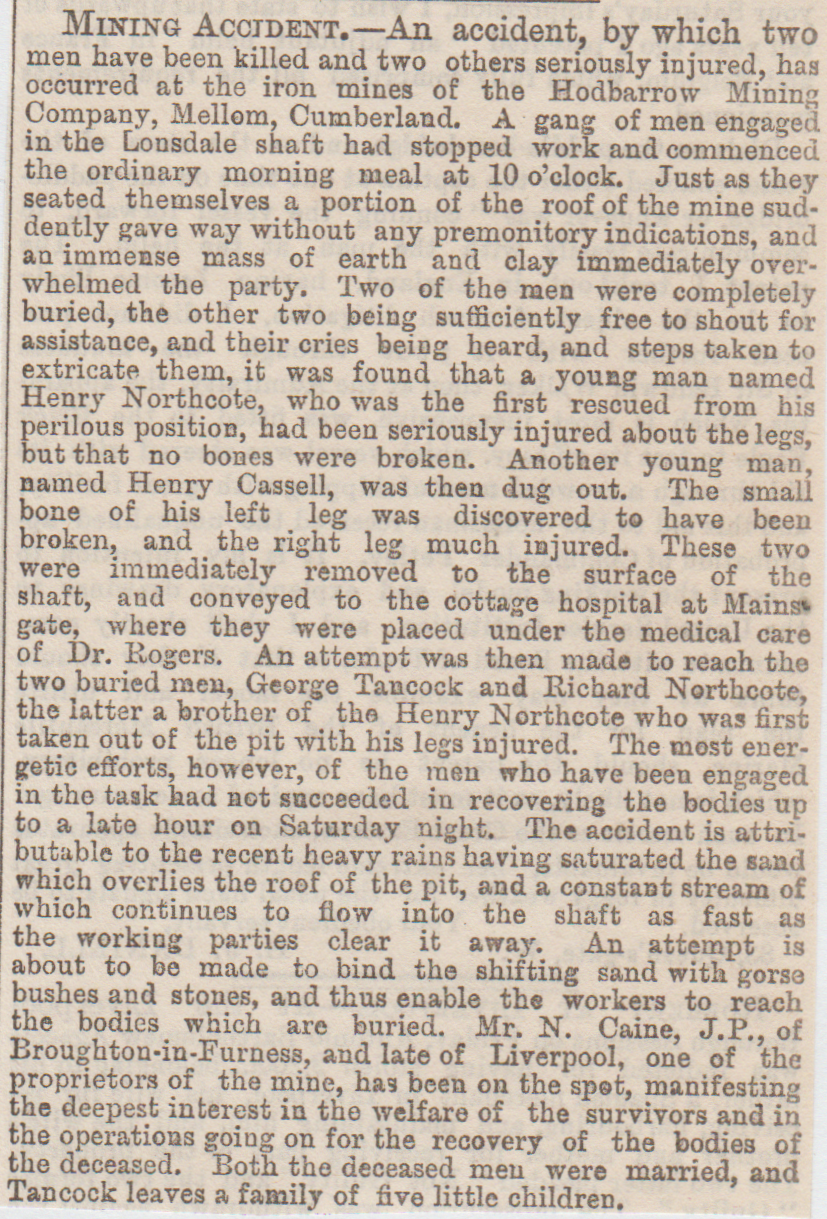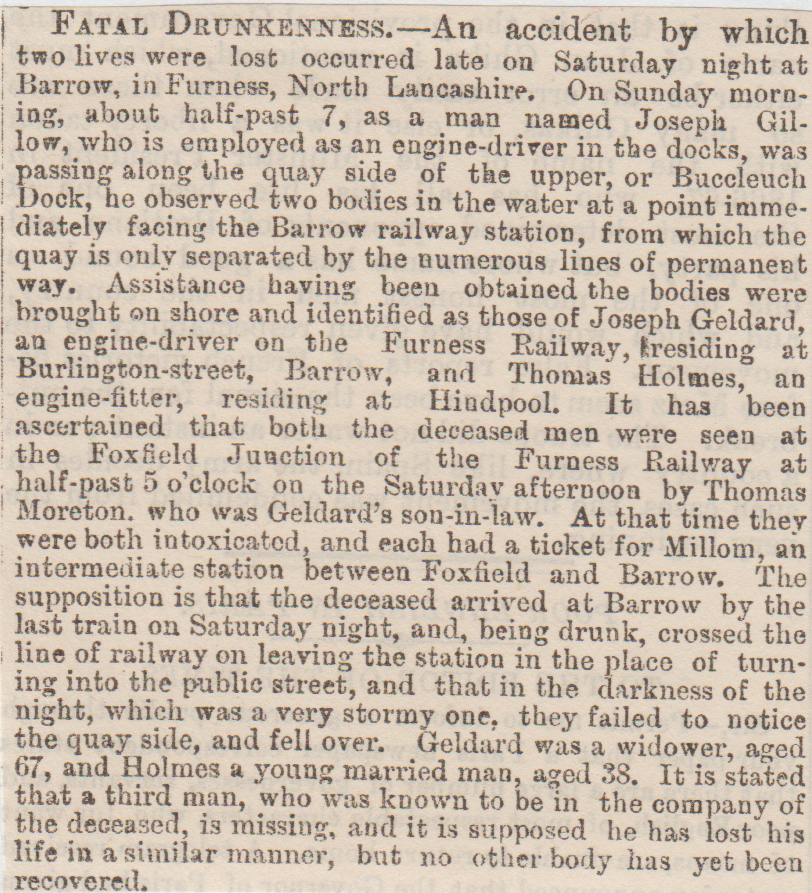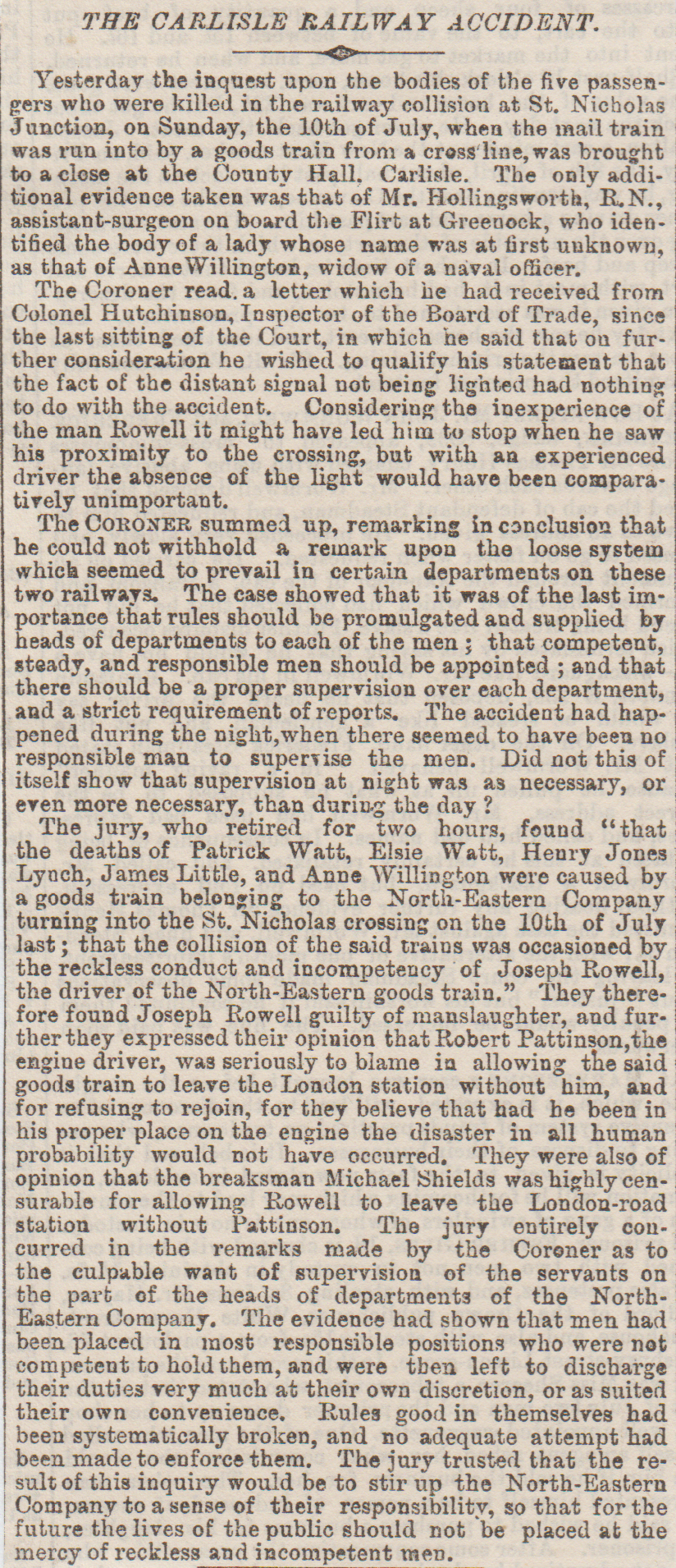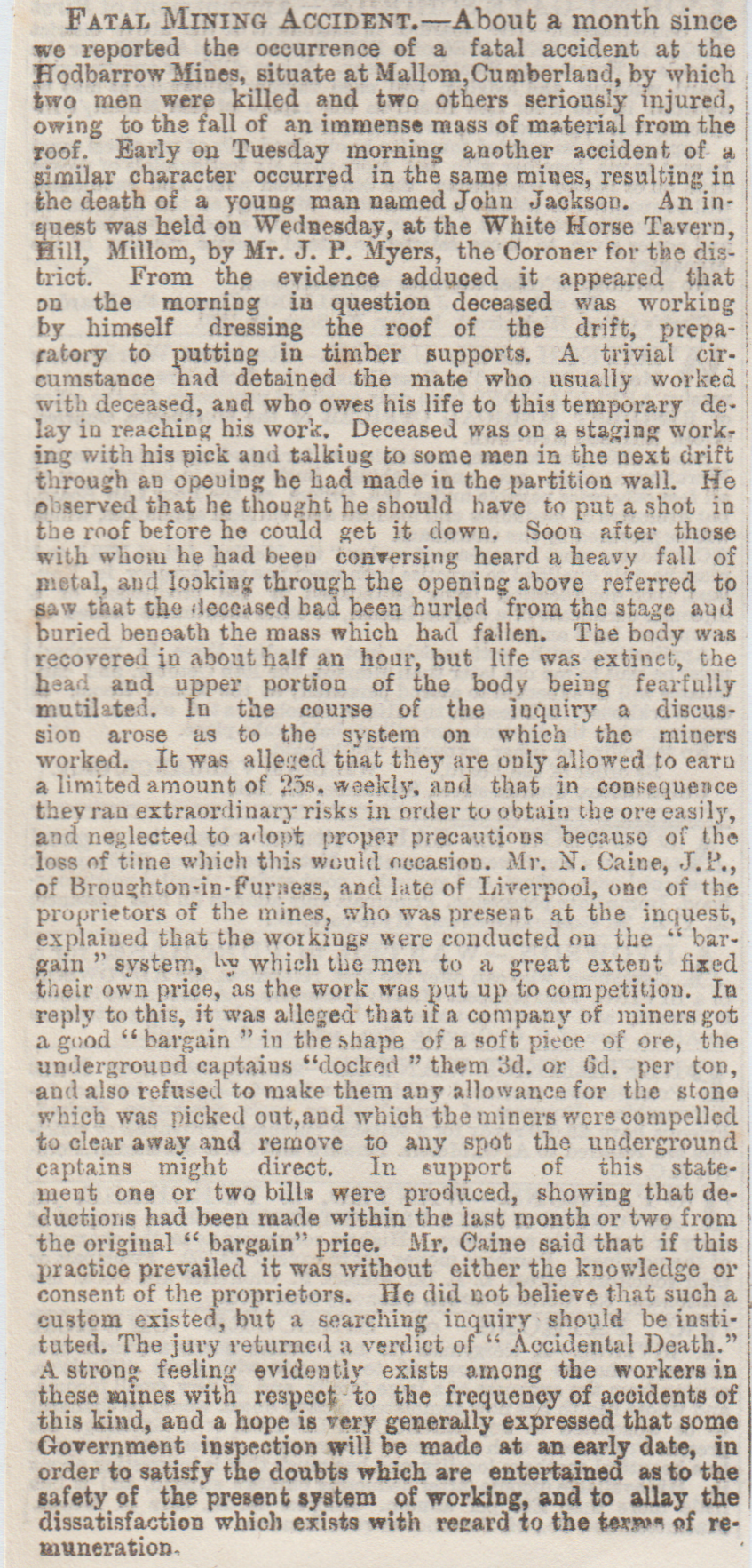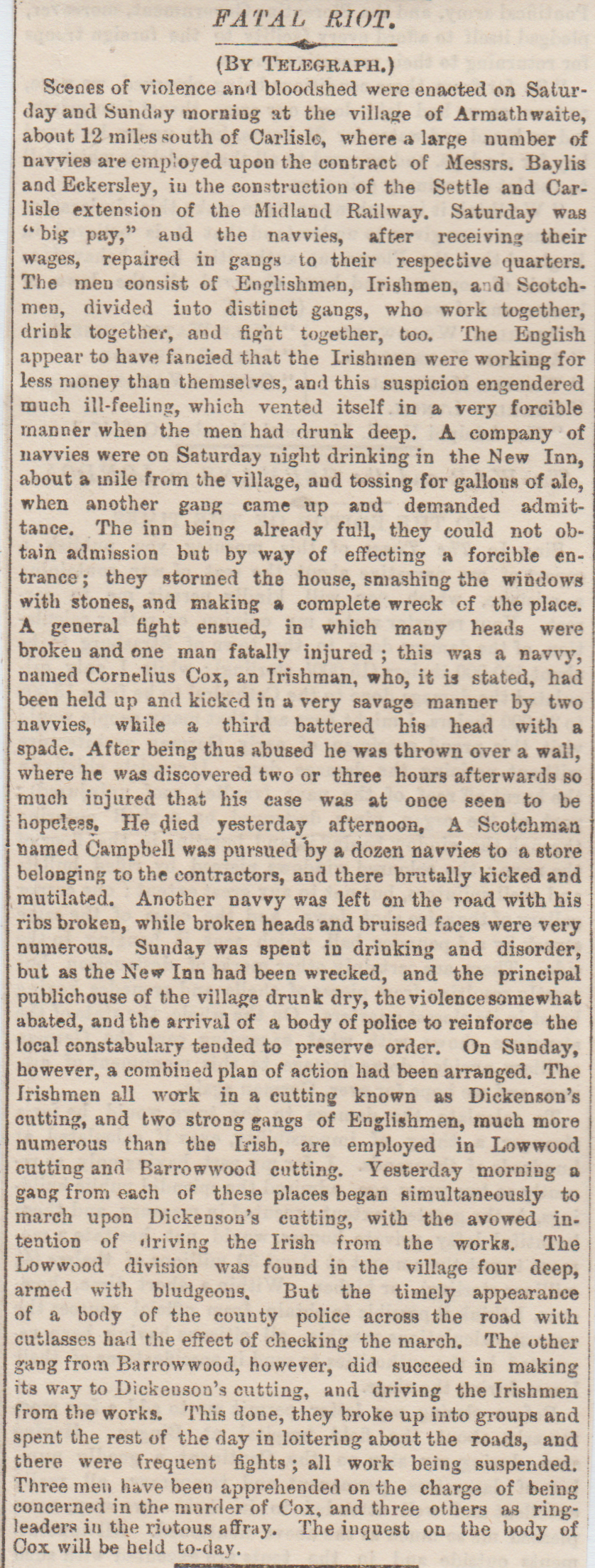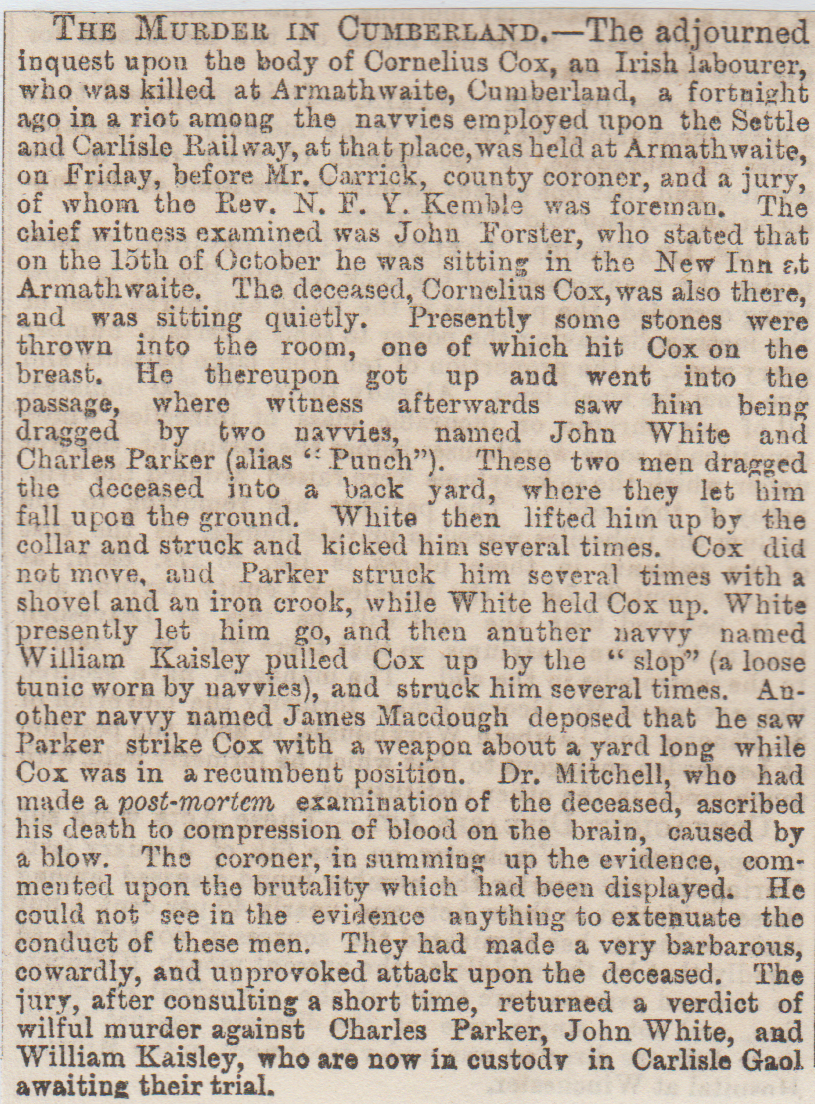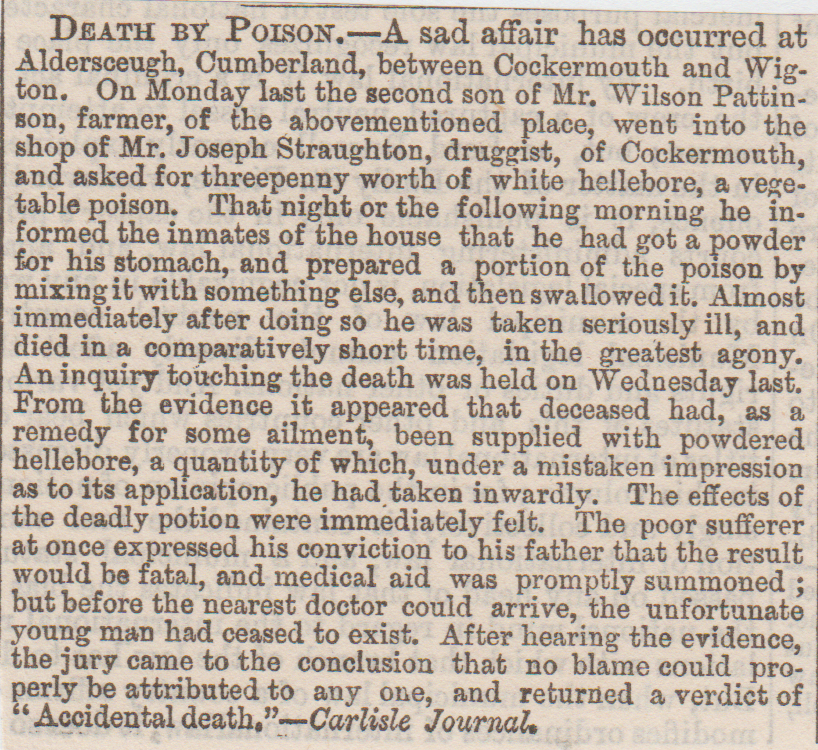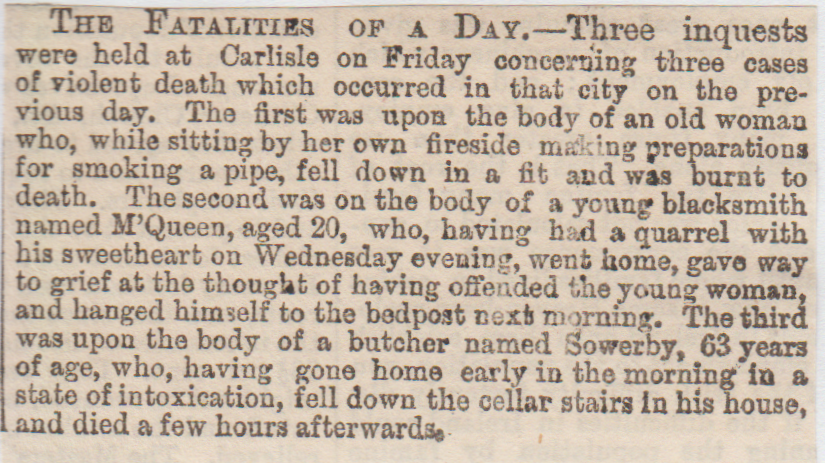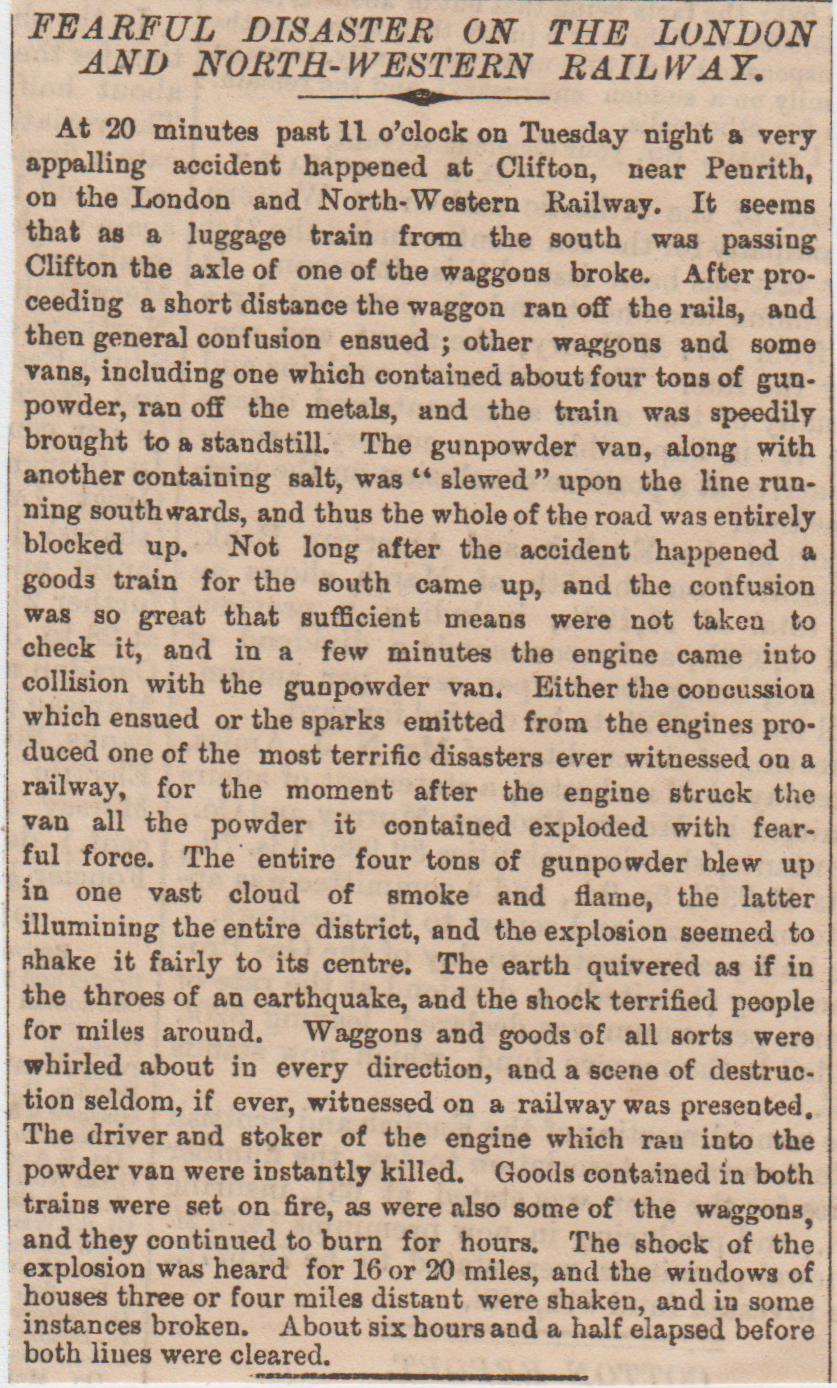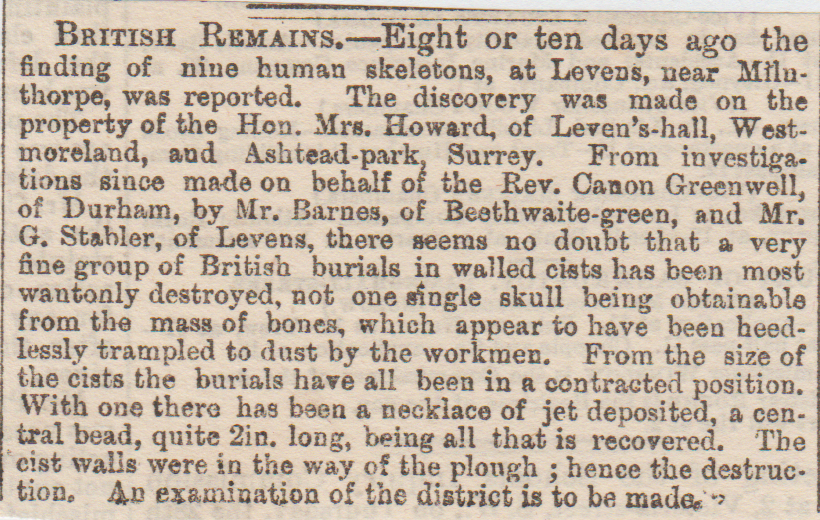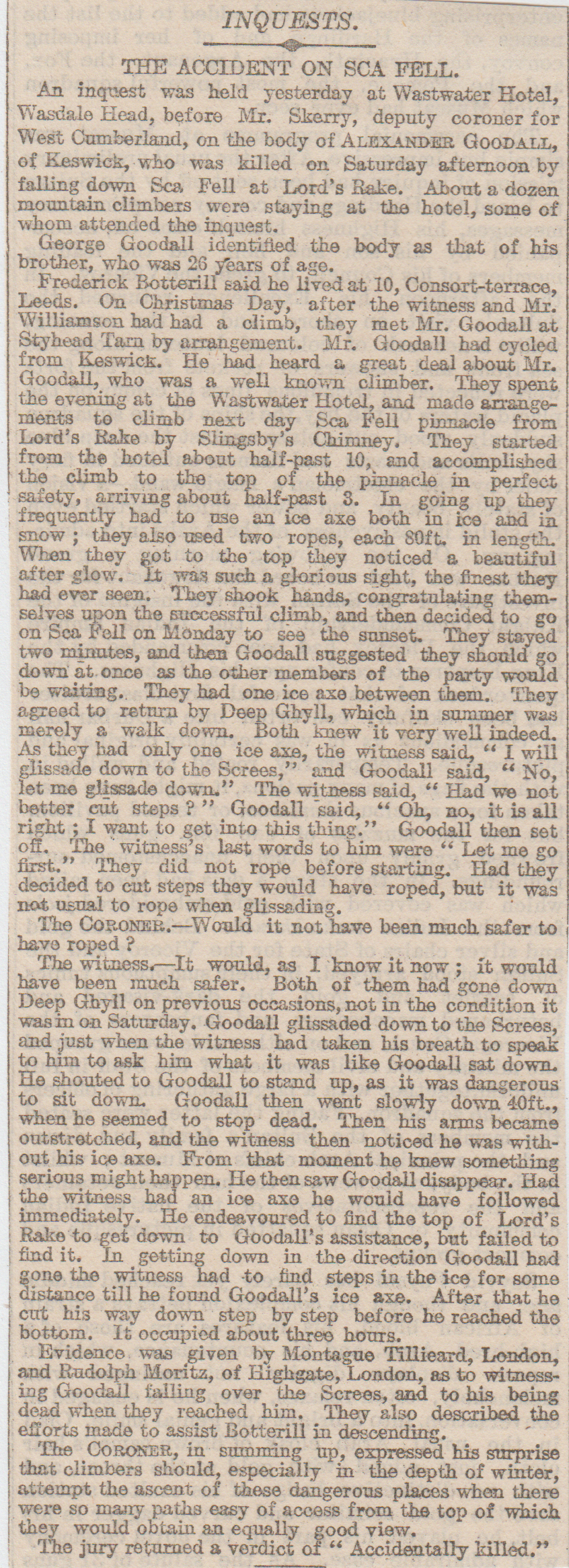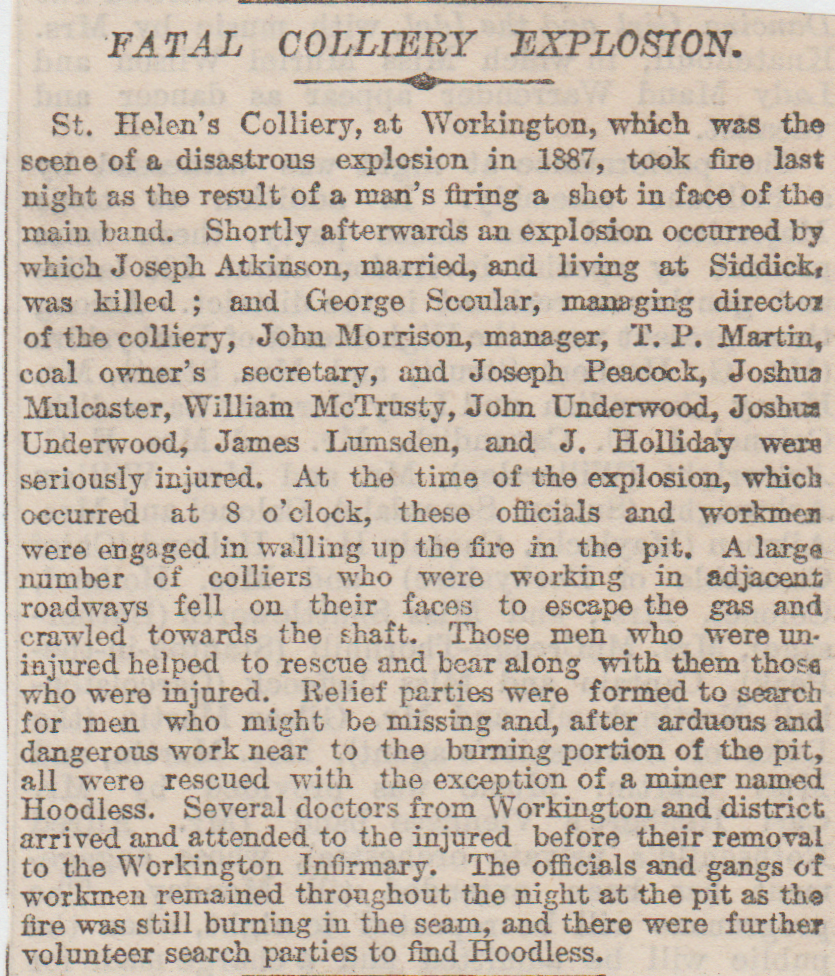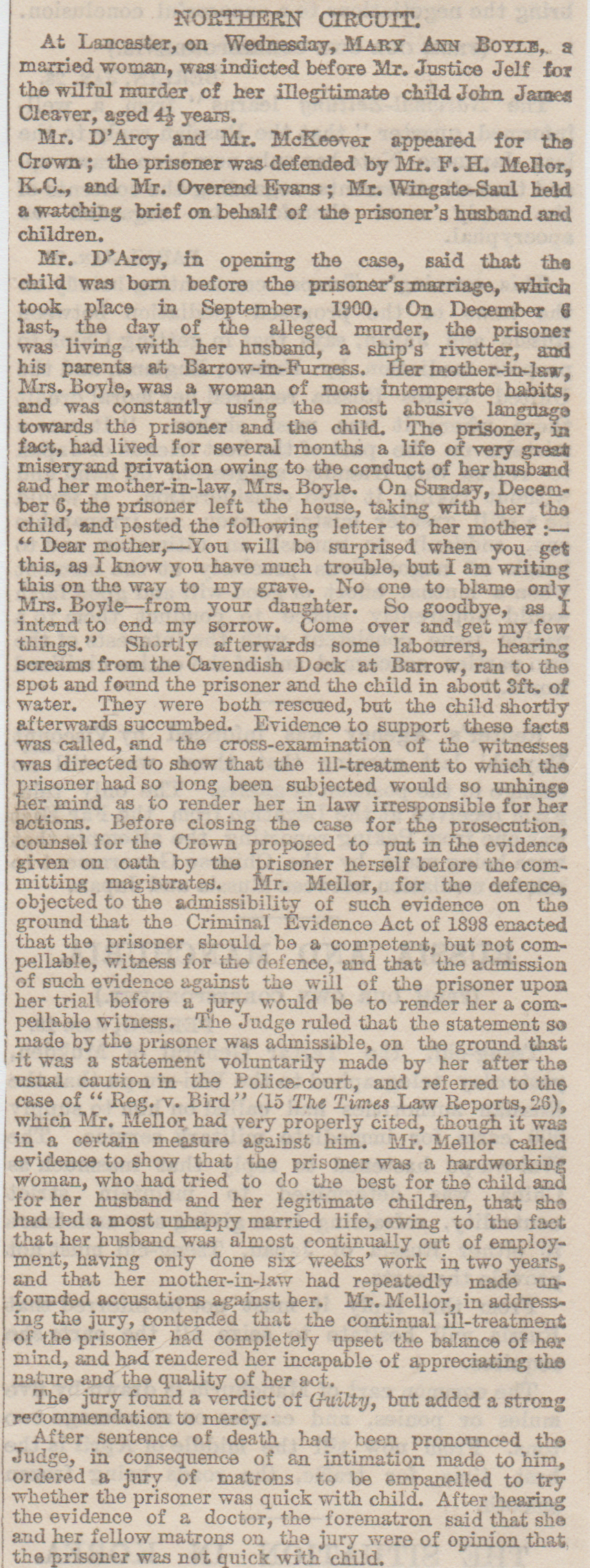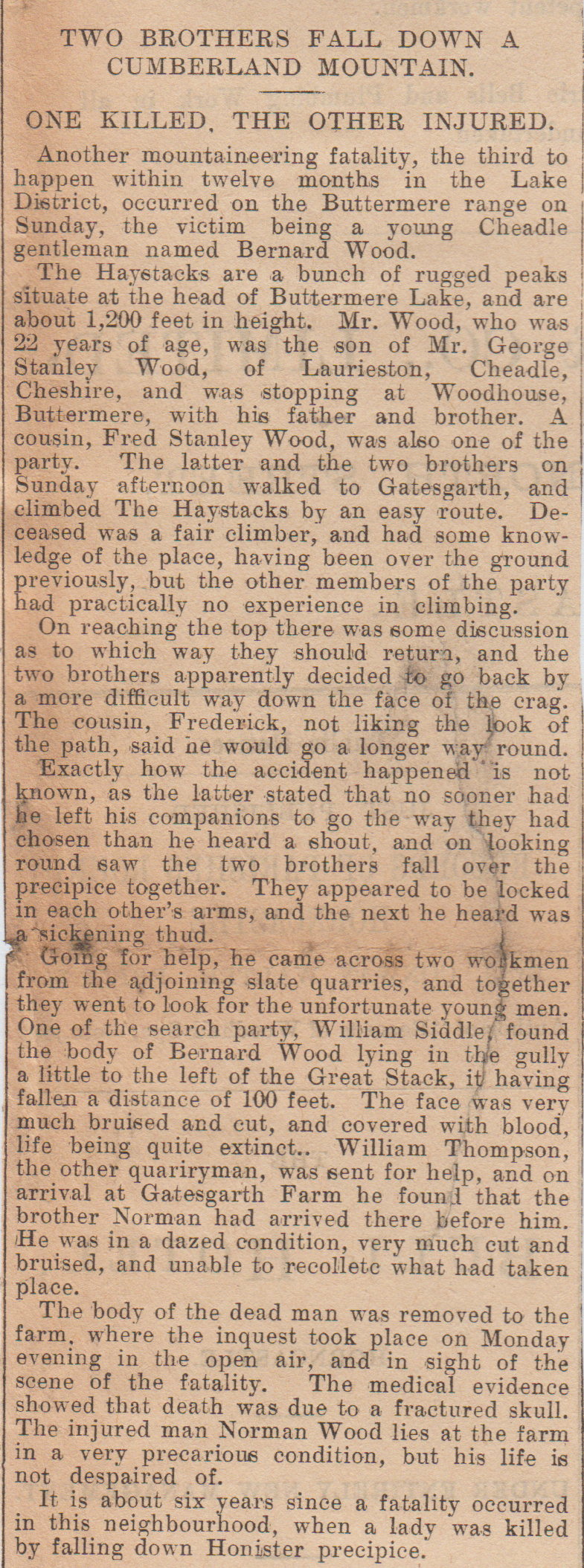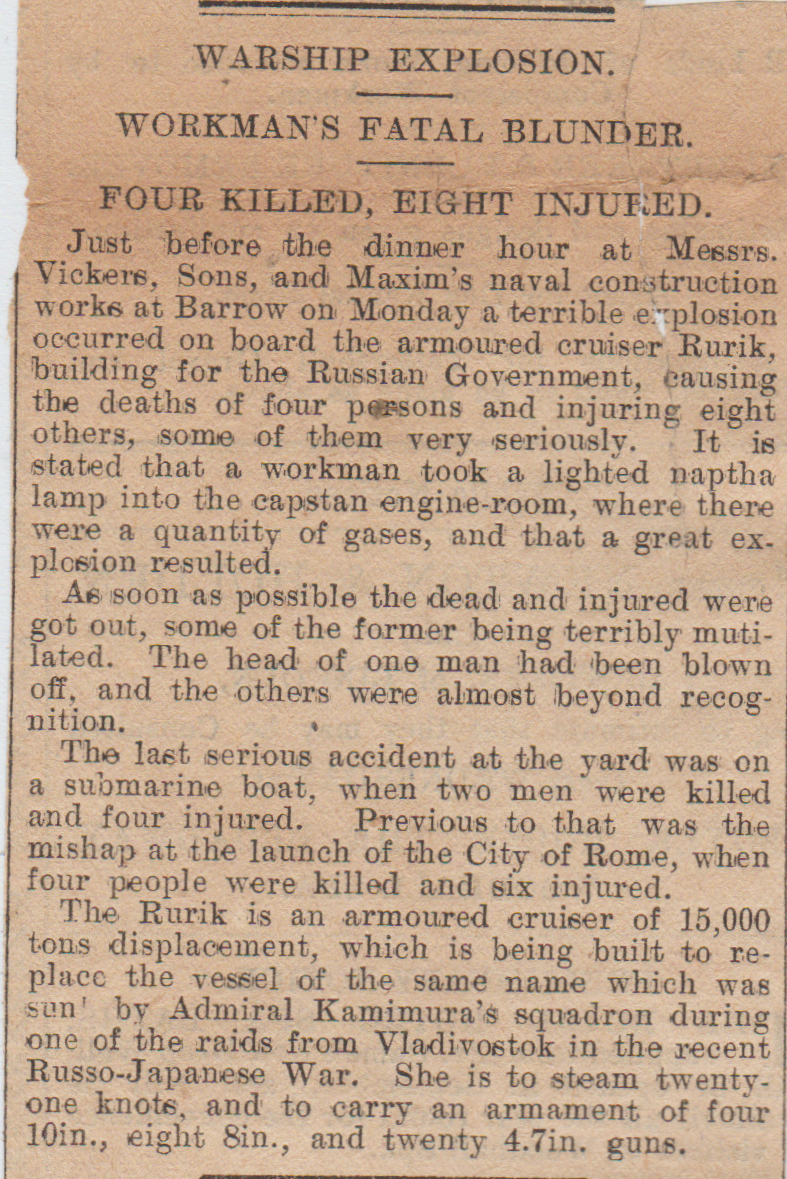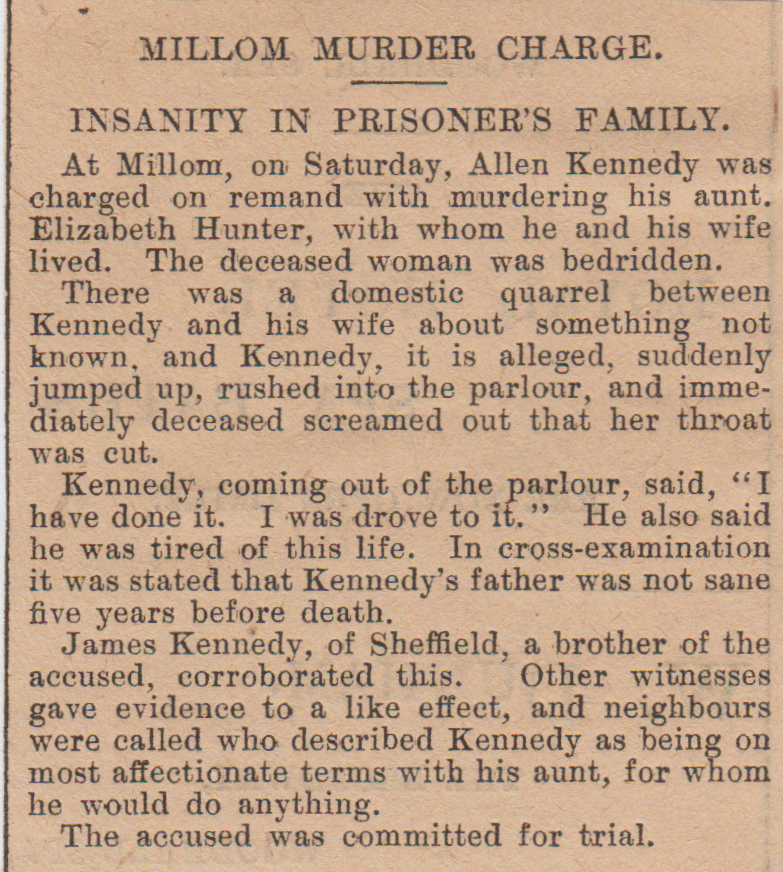1/ Workington, (Painful Suicide) May 1890
James Hadfield had recently lost his wife and took to drinking heavily with depression setting in as a result. Instead of jumping in front of a train or shooting himself, he shoved a lady’s hairpin through his throat and smashed himself over the head with a broken glass. It must have been painful, but it worked as he died an hour later.
2/ Dalton-in-Furness Cemetery Suicide, June 1893
James Holmes a publican, was found hanging from a tree in the cemetery in Dalton-in-Furness. He had been suffering from depression and had been drinking heavily too.
3/ Whitehaven Boating Accident, July 1882
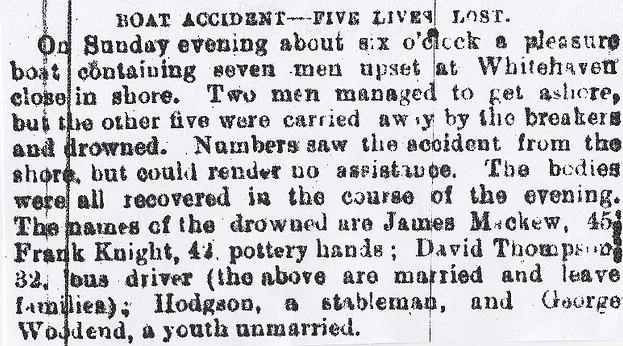
Windermere (Accidents and Suicide)
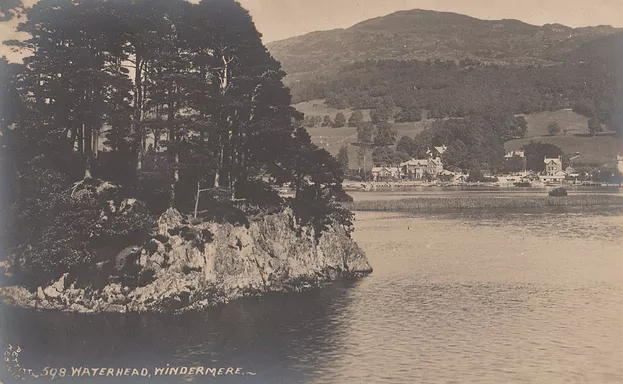
4/ Windermere Ferry Disaster, October 1635
A wedding party had been to Hawkshead and the market, when they clambered aboard the ferry and set off, it foundered and sank drowning everyone on board, a total of forty-eight passengers and crew. It was down to bad weather and packing too many on the ferry.
5/ Windermere Fatality, December 1878
A man called Tomlinson was making the journey from Bowness to Cunsey in a boat when the steamer “Firefly” tore into the side of his craft. He flailed around in the water when he got caught in the paddle-wheel and was churned it. He was a retired leather merchant in Stockport and was killed on the spot.
6/ Windermere Vicar Suicide, November 1894
A vicar from Leicester made the trip up to the Lake District to kill himself. Reverend T.Pearse Tretheway left a book on his lifeless body and inside was this;-
“I have come to the solitude of Scawfell and the glorious lake mountains, which I have so often admired, To escape from my troubles and to end my days, to die by sweet Windermere. My dear wife, forgive me for what I have done”.
I was going to say he had a tough parish, but it was all down to finances again. The verdict was “Suicide while temporarily insane”
7/ Lake Windermere, August 1873 (Five lives lost)
Mr Cooper from Crewe had retired here and intended to take it easy. He hired a sailing skiff at Bowness and the idea was to splash about the lake for a day and watch the yacht race. He took his wife, her sister(Miss Bateman) and a page named Robert Killett who was only fourteen, along with a twenty-one-year-old boatman, George Holmes. They went out at nine a.m.and at about one p.m.they landed on the Lancashire side and had lunch at the Ferry Hotel. The weather made a turn for the worse, the wind got up and it began to rain. George Holmes told Cooper not to sail the skiff in such conditions, but he ignored the advice, instead, following the yachts in the race. A sudden downpour and movement in the boat caused it to capsize sending all the occupants into the lake. A lone man spotted them in trouble and he raised the alarm. They searched but found nobody, as it was in 120 feet of water. Next day they dragged the lake and Miss Bateman was the only body to be found. Mr and Mrs Cooper were only thirty years old, but they left a one-year-old infant with no parents.
8/ Lake Windermere, October 1890
Robert Fulton Lang had an operation at the beginning of the year, so his health was precarious, to say the least. Also, his investments had gone wrong, so the two things coupled together made him a manic depressive. He drowned himself in the lake as a solution to his problems. “Suicide whilst temporarily insane.”
Grasmere Lake.
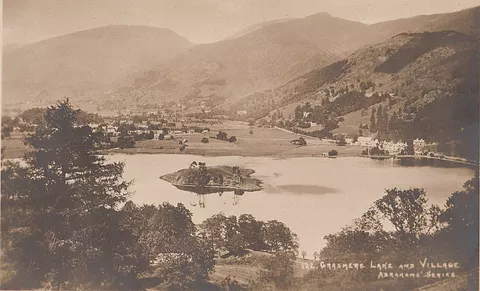
9/ Grasmere Drownings
Two fourteen-year-old boys, William Hudson Usher and Thomas Birkett were drowned when they were sent on an errand. They took a shortcut by getting in the boat and going across the lake. They gave their message and disaster struck when they both slipped into the lake. “Accidental Death” was the verdict.
10/ Grasmere Lake Drowning, July 1866
A young bloke from London, by the name of Elyas, went out on the lake in a hired boat from the Prince of Wales Hotel and headed south of the island to bathe. He jumped in, swam about for a bit, then he screamed for help, due to cramp, then sank like a stone before anybody could get to him. His body was fished out later that day.
11/ Thirlmere, June 1908 (Traction Engine Accident)
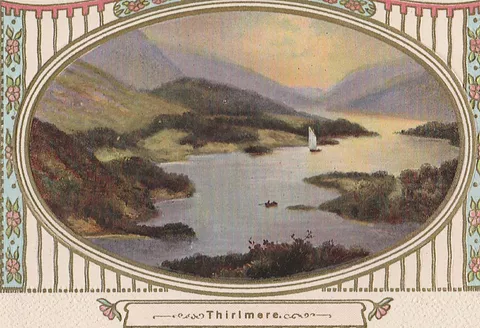
A traction engine and two caravans toppled down an embankment, on a road that was not fit for traffic. The two young men who were on the traction engine, Thomas Hector Allen aged twenty-two, and Francis Wood aged twenty-six, from Kings Lynn, were catapulted a hundred and fifty feet down the slope, and the engine went into the east side of Thirlmere Lake.
12/ Greenodd Drowning, September 1906 (Drowning)
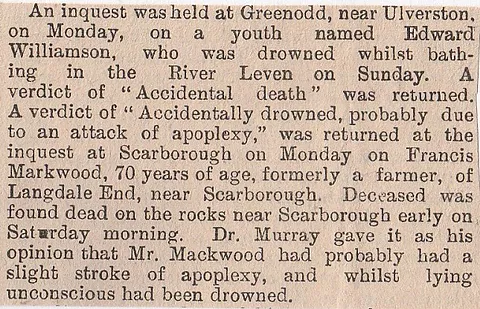
13/ Halstead House Fatality, Ullswater, September 1906
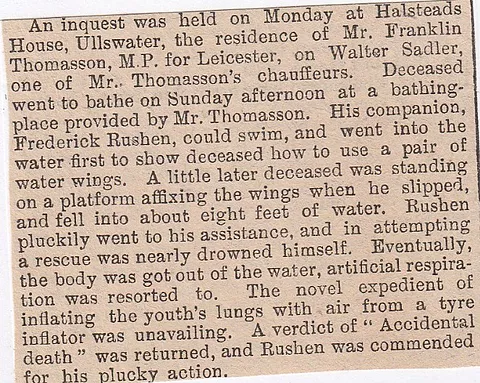
14/ Thornyscale Fatal Accident, October 1897
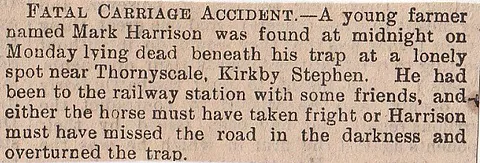
Derwentwater Deaths
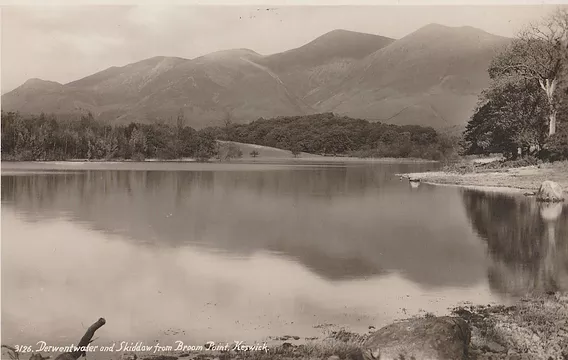
15/ Derwentwater Drowning, September 1877
A law student from London, by the name of Dixon, and the son of Mrs Bell of Derwentwater Hotel in Portenscale, was drowned in the lake. In trying to take his turn to row, he rose from the seat and the boat toppled over and in he fell. The other person in the boat rowed around looking for him but couldn’t find him, so went ashore to report the accident. His body was found the next day. There is a coincidence here, by the fact that thirty-three years ago (1844) his father was drowned in Derwentwater in the same way.
16/ Derwentwater Boat Fatality, July 1882
A day-tripper from Egremont, named Richard Clark, was drowned in Derwentwater due to the boat they’d hired becoming full of water. The two other men with him managed to get rescued, but Clark’s body has not been found yet.
17/ Derwentwater, August 1898 (Five Ladies Drowned)
An unfortunate accident on Derwentwater led to the deaths of five young women. The boatman said to the customers that the boat could take eight passengers, when in fact six was the maximum. As there were three men and five women in the craft, one of them changed seat from bow to stern. Later on, one of the girls lost a satchel, so they stopped rowing in a bid to get it back. The boat then began to sink (overladen on one side?). The lasses were struggling but the oars were used to help them and eventually they came back to the lads, who were rescued by two men.The girls were all from Nelson in Lancashire and all members of the National Home Reading Holiday. The capsizing of the boat occurred just after passing out of St Herbert’s Island. Their names were:-
Mary Alice Smith, Mary Jane Smith, Nancy Pickles, Helena Clegg and Frances Crossley.
18/ Maryport, (Six Lives Lost) September 1878
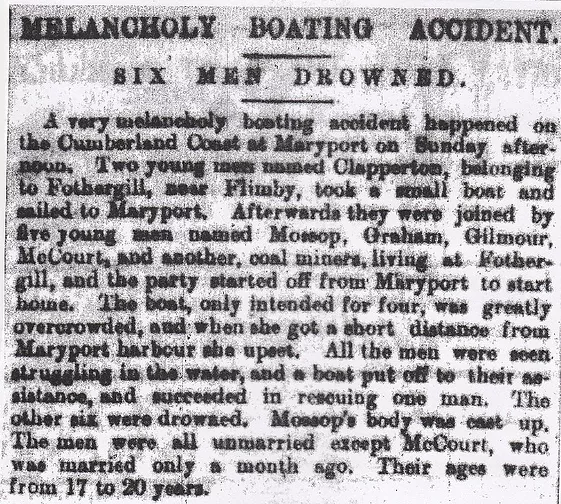
19/ Sprunston Child Murder, near Carlisle, November 1881
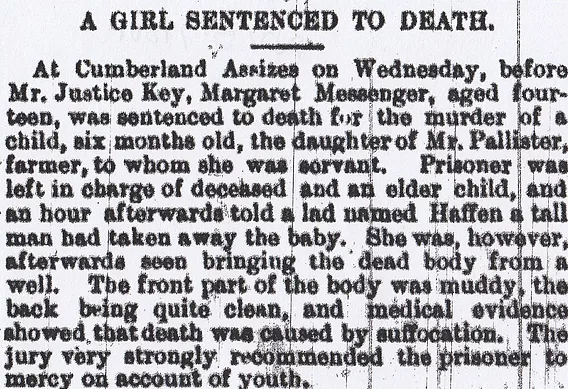
20/ (Embleton) Bassenthwaite Murder, April 1860
It was actually at Embleton on Bassenthwaite Lake! The woman in question was a servant to Mr Thomas Fearon, a farmer who resided at Beck House in Embleton. She went by the name of Graham and one day the master and mistress of the house went to Cockermouth, leaving Graham in charge. Some men employed by Mr Leather of the Royal Oak Hotel in Keswick and a Mr Ladyman, a spirit merchant, went to Beck House and had dinner there after carting some hay there. They left and she was all alone except for a farm servant named John Cass. At 3-30 a neighbour found the place quiet and derelict. They wondered where she was and went to the kitchen. There she lay, with a brush and black lead in her hands (for cleaning the grate), and her throat cut from ear to ear. The murderer had tried to be clever and make it look like suicide, by putting a knife in her hand. The knife was in a reverse position, the back away from the wrist, and she had suffered severe bruising on her arms suggesting murder and the wall had bloodstains on it, resembling a man’s palm print. Cass was arrested.
21/ Bassenthwaite Lake Skating Fatalities, December 1879
Thirty-one-year-old Joseph Bolton, and Emily Watson, of Cockermouth, were both drowned on Bassenthwaite Lake when the ice gave way while they were skating.
22/ Kendal, (Attempted Murder/Suicide) January 1890
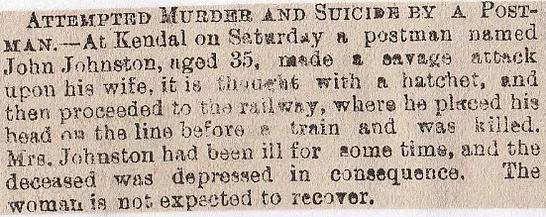
23/ Carlisle Execution, March 1892
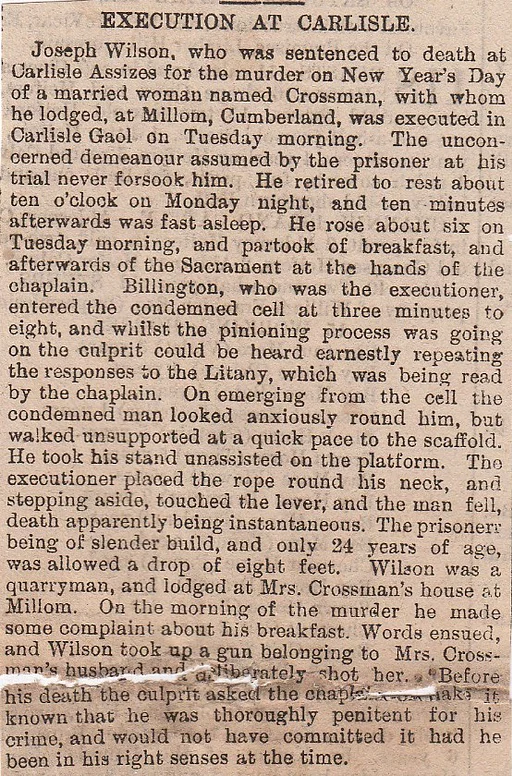
24/ Millom Police Station Suicide, August 1910
Inspector Thomas Smith was the boss at the Millom station of Cumberland Constabulary. He was on duty one night, then went back to Millom police station to do some work there. He had been gone quite a while and other constables were asking his whereabouts, but nobody knew. They looked around for him and found the ante-room locked. They broke the door down and saw him hanging from a noose. He left a wife and six kids. He also left a note saying why he did it:-
“I cannot stand this persecution any longer. I have been persecuted by the chief-constable for over two years. The contents of the letter will explain.” The Chief-constable mentioned in the letter, Mr P.Church, denied the accusations but stated that Smith had been given a warning by him for neglect of duty. Verdict “Suicide during temporary insanity”
25/ St Aidan’s Vicarage, Carlisle, (Baby Left at Door) January 1910
The vicar of St Aidan’s church in Carlisle, the Rev.F.L.H.Millard found a new-born baby boy in a brown parcel on his doorstep at the vicarage. The child was taken to the workhouse to be looked after for the time being and has been given the appropriate name of Thomas Aidan Carlisle.
26/ Workington Mystery, March 1882
On the road leading to the steelworks in Workington, there appeared a heap of stones, and beneath them lay the body of 17-year-old Lucy Sands, who’d been missing three or four months. It was found in a terribly mutilated condition and was found at 10 a.m. one morning by a stone breaker who was just starting work. It remained unidentified for a while due to its poor condition and an inquest will open soon. (Did they find the murderer?).
27/ Belltash Wood Suicide, Windermere, January 1889
In Belltash Wood, about a mile from the Ferry Hotel, Windermere, a body of a well-dressed gentleman was discovered. He had a revolver with two chambers loaded out of the six chambers and it had been there some considerable time. The skull had fallen from the trunk and it was just bones. Identification would be near impossible but suggested it could be a visitor to the area who shot himself.
28/ Distington, (Naughty Vicar) October 1885
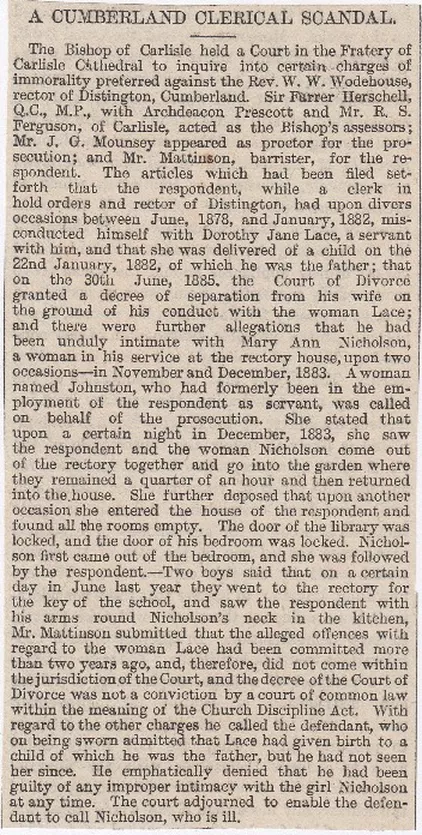
Distington, November 1885 (Naughty Vicar)
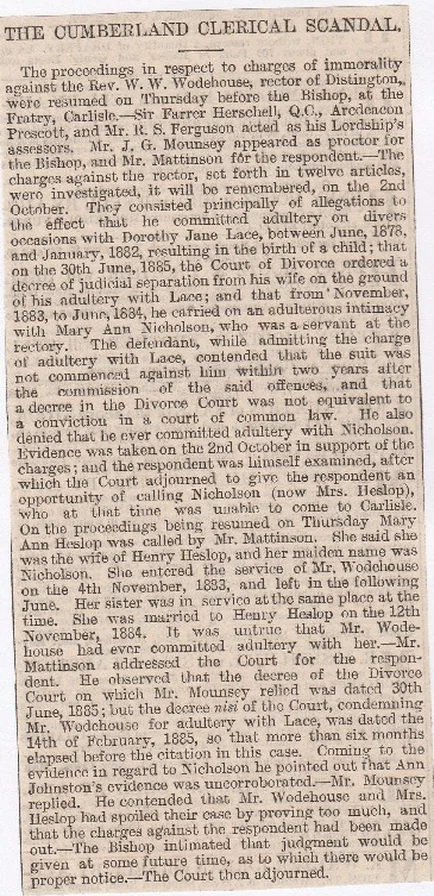
29/ Carlisle, December 1870 (Two Dead Infants in a Box)
In September, a small box only eighteen inches long wrapped in light paper, with the address “Mr Thompson, Royal Hotel, Carlisle, to be left till called for” arrived at the train station. It stayed there for over two weeks and no one claimed it, so it was sent to Euston Station as unclaimed baggage. Nearly three months after it was sent it was opened, and to the horror of the clerk, it had two dead children in it. There is no Royal Hotel in Carlisle and should have been “County Hotel.” The infants were sent to St Pancras Workhouse and examined. The boy was aged two to three and the girl aged four to six months, and they’d clearly died from violence. It is now a case of double murder.
30/ Low Row (Body Discovered) July 1887
A shocking discovery was made at Low Row, Cumberland. A young man by the name of John Tomlinson, who was a former tenant at a farm at Belle Vue, Carlisle, vanished. His body was found in a quarry a few days later. His face had been eaten away by insects so was not easily identified. He had gone out looking for ferns and fell down in the quarry.
31/ St Bees Student Killed, March 30th, 1885
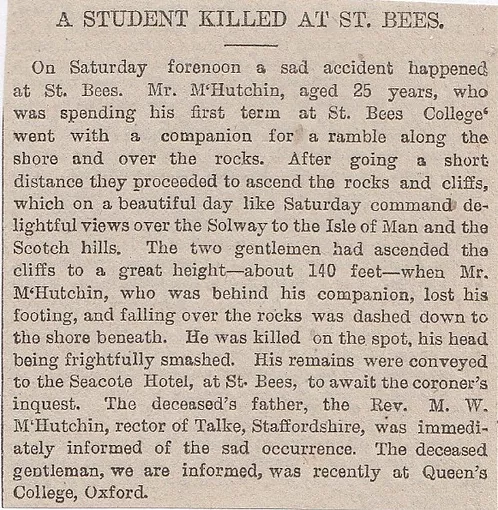
St Bees Fatality, March 31st, 1885
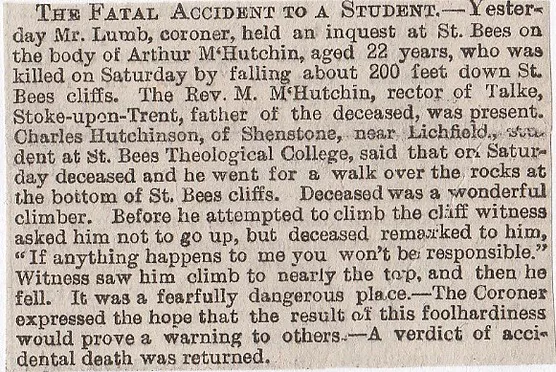
32/ River Eden near Carlisle, August 1887 (Detective Suicide)
Detective-sergeant George Purbrook of R Division in the Metropolitan Police which was stationed at Deptford made the long journey to Cumbria to commit suicide. His body was in the River Eden near Carlisle and was found by police after a man came into the station with his hat and some papers, and said he’d found them on the banks of the river. In a notebook was written:
“Please telegraph to the Superintendent McHugo, Blackheath, London. He is the Superintendent of Greenwich Division. Kind love to wife and children and relatives. Oh! My poor head! Ask McHugo if he will recommend my children for the orphanage. God forgive me!”.
Police in London hadn’t heard from him until Cumberland police told them of his death. Purbrook had the onset of rheumatism and was scared of the police drafting him out. “Suicide while temporarily insane” was the verdict.
33/ Near Dalton Railway Station, July 1885
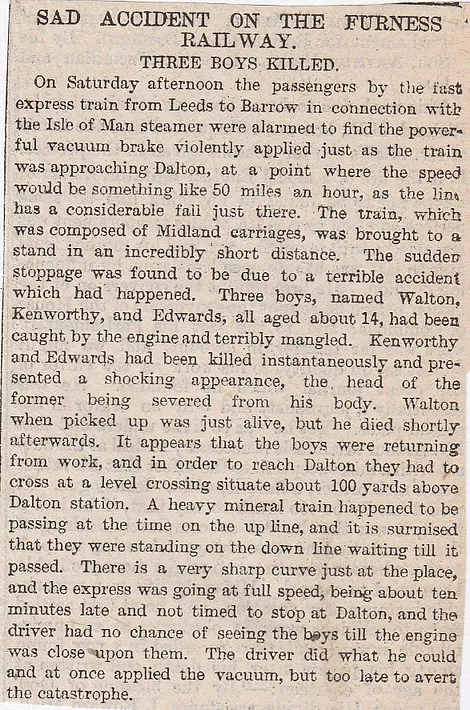
34/ Dalton Railway Station, August 1885
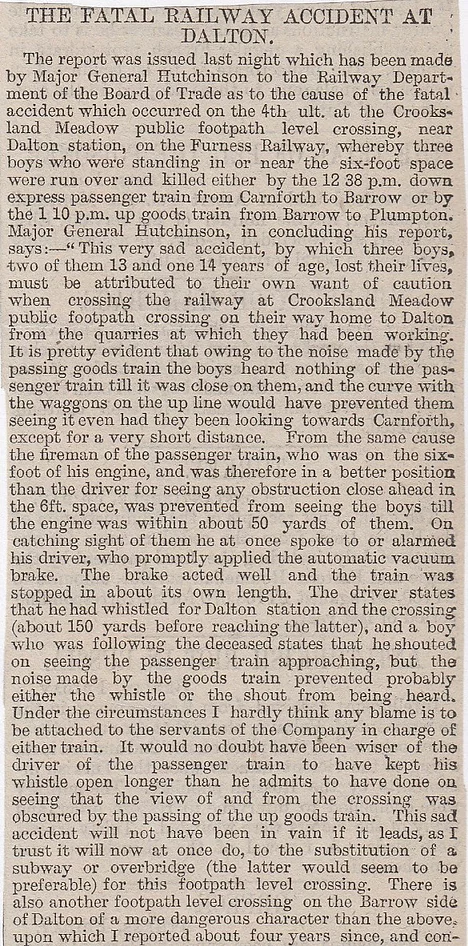
35/ The Helm near Kendal, (Suicide Found after Two Years) December 1909
On the Helm near Kendal in a smallpox hut, a body of a man was discovered with his head blown away by a shotgun. What is unusual about this case, is that he’d been missing for nearly two years! He was William Dawson a highway superintendent for Westmoreland County Council and the gun was next to his body. The body itself was in a condition that suggested it had been there two years. He was last seen in January of 1908 in Kendal.
36/ Gatebeck Explosion, near Kendal, June 1885
An explosion occurred some miles from Gatebeck near Kendal. Two men, it is reported, were killed and several injured. The accident is attributed to blasting operations.
37/ Silloth Drownings, July 1885
Two young men-one named Brown, one a banker’s clerk from Carlisle and the other, the second son of the Rev.W.A.Wrigley, Congregationalist minister-were bathing in the sea at Silloth, when they got into a strong current and both were drowned.
38/ Barrow-in-Furness Murder, December 26th, 1885
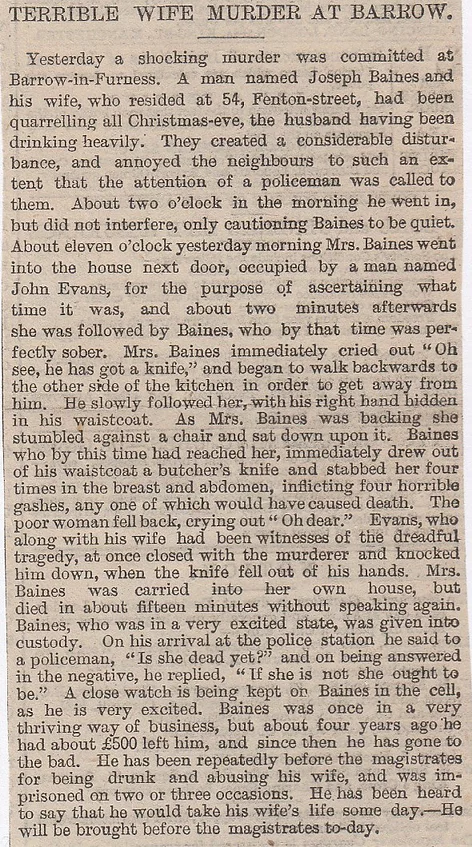
December 29th, 1885 Barrow Wife Murder
The coroner held an inquest on the body of Mrs Baines, who was stabbed by her husband on Christmas Day. He was charged with wilful murder. Evidence disclosed states that Baines borrowed the butcher’s knife for his murderous purpose and sharpened it in order to be sure.
39/ Millom Ironworks (Dreadful Accident) May 1899
William Brown a stoker, met with a dreadful death at Millom Ironworks. He was engaged with an engine-driver in shunting some waggons on the pier. He got off the engine and went around the bogey end and was next seen under the wheels, when several waggons passed over him, cutting him in two. He was married last month.
40/ Low Gill Train Death, April 1899
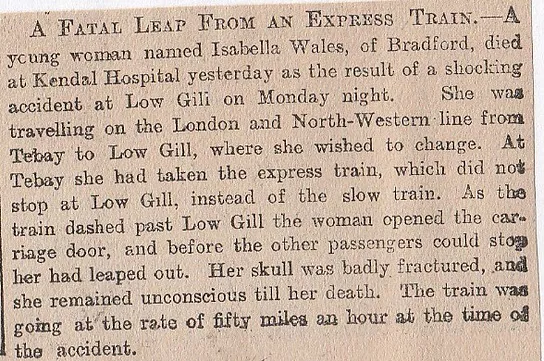
41/ Derwentwater Drownings, August 1885
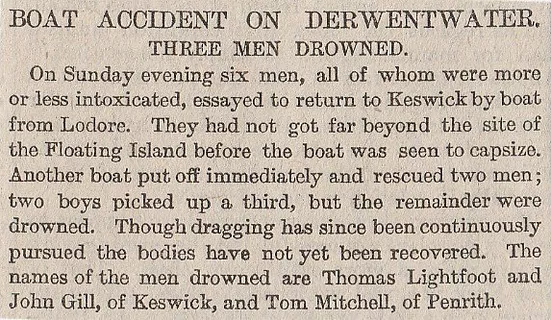
This should be further up the list, sorry!
42/ Bush Hotel, Carlisle, February 1860 (Still there, but boarded up)
In mid-March 1859, a large box was dropped off at the Bush Hotel, by a porter from Caledonian Railway Co. The postmark was from Paisley in Scotland and the address was “This side up- Mrs Loudon Bush hotell, Carlisle”…spelled like this, not an error. As is usual in these cases nobody claimed the package and it was moved about for nearly ten months. Meanwhile, a Mrs Loudon was found and asked to pick up the parcel at the Bush Hotel. Her niece picked it up for her and opened it to see if it was for her auntie. A little coffin was inside and in the coffin was the corpse of a child, well-dressed with a cap on its head. It was taken to the police, who are trying to gain information on who the child is. The body was badly decomposed, due to nearly a year of internment and only the hair could give any details as to whether it was male or female. It had a boy’s haircut and was about three years old. (Was identity ever discovered?)
43/ Windermere Drownings, June 1899
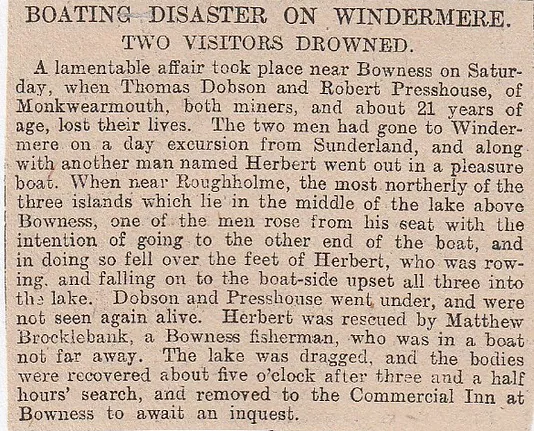
44/ Ramsden Dock Fatality, Barrow, June 1899
Albert Louis Mesteraged twenty-three, a blacksmith, was along with his brother bathing in Ramsden Dock, Barrow. They were leaving the water by means of the steps when Albert suddenly fell backwards into the dock and sank. His brother made several unsuccessful attempts to rescue him. Dragging operations were commenced, but only after three hours hard work was the body recovered.
45/ Dry How, August 1854 (Father Scythes Daughter)
John Hyslop was a mower by trade and he was busy scything in a field with his little five-year-old girl for company. He was scything one piece of land when he took a wider arc than normal and the scythe cut his girl’s neck, on her jugular vein. Any deeper and the cut would have been instantaneous death. (Did she survive?)
46/ Lake Windermere Fatality, August 1885
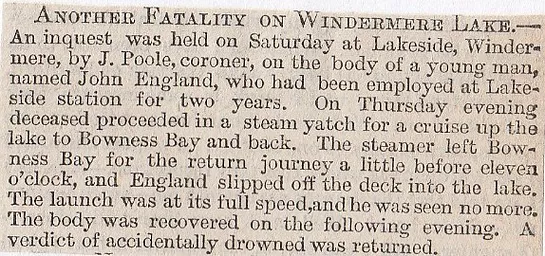
47/ Lake Windermere Boat Accident, September 1885
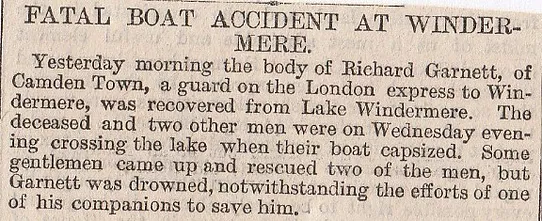
48/ Wetheral Bridge Suicide, near Carlisle, November 1881
As a train approached Wetheral, on the Newcastle to Carlisle section of the North-Eastern Railway and was just crossing the bridge over the Eden, a busker opened the door of the carriage and leapt out into the river. He had been busking at a fair and was drunk, and had already told someone that he’d jump out of the train. Two of his fellow passengers tried to prevent his actions but he wrangled himself free. He is unknown and the body hasn’t been recovered yet. (Bridge still there?)
49/ Furness Abbey Suicide, May 1869
Mr John Wren was the new landlord of Cavendish Arms Hotel in Dalton, but for some reason, he killed himself after only a week. He was seen to enter the tunnel at Furness Abbey and at eleven o’clock that night, a train going through ran over him, totally decimating his body. Before the train cut him to bits, he slit his throat and this caused death within minutes of the collision with the train. Police found a couple of knives in the tunnel near the corpse. He leaves a wife and child. (Small tunnel right near the railway station, covered in branches and ivy.)
50/ Moss Bay Point Shipwreck, September 1885
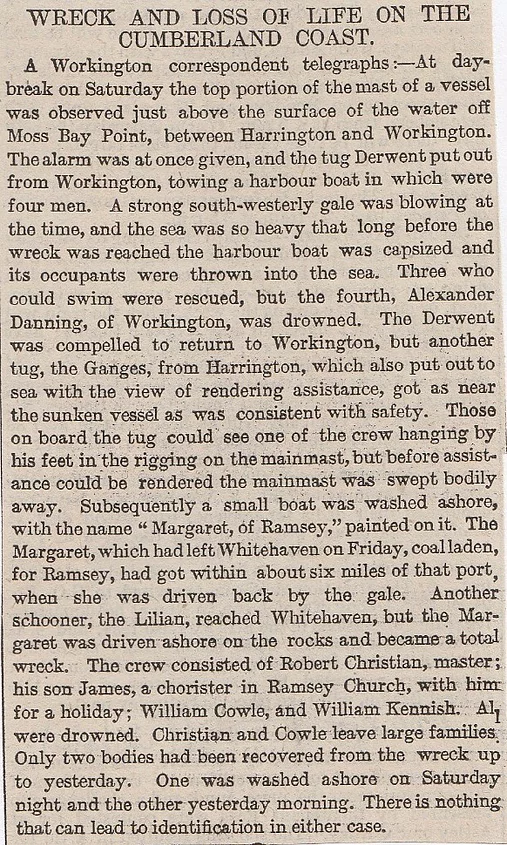
51/ Carlisle Old Brewery Co., Carlisle, June 1899 (Drowned in Cask of Port)
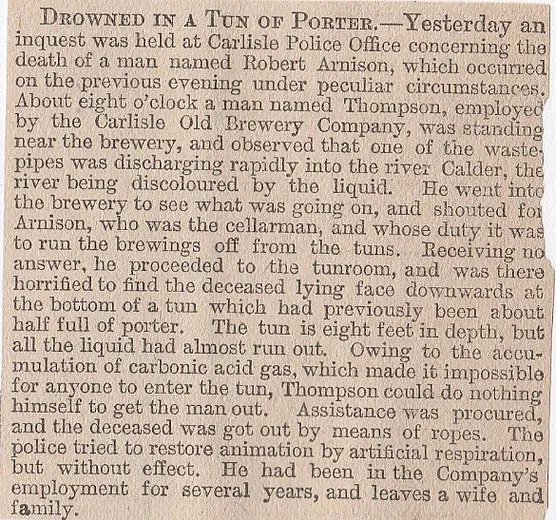
52/ Scafell Pike, October 1908 (Two Brothers Killed)
In this case, it was known as Scawfell Pike and is England’s highest mountain.(Nearly 1000 metres high).
Two brothers, F.Adam Sprules from Sheffield, and A.W.Sprules from Saltburn-on-Sea arrived at Wastdale and booked into a hotel and the following couple of days went climbing with no problems at all. Midweek they went up Scawfell Pike and were expected back the same day. The next day a search party went up the mountain and when they reached the cairn, to the memory of J.W.Robinson, they had dinner. While nibbling on a sarnie they saw a rope suspended in the vicinity of the North Climb. They went to the rope and found the two brothers, stiff as a board. They took F.Sprules back to the hotel and had to leave A.W.Sprules till the next day. (The other story of Scafell Pike is in December of 1893 when Professor Marshall was killed when he fell down the Pike. -Jupp, Broadrick, Garrett, and Ridsdale fell while climbing it. The first three were killed outright, but Ridsdale was rescued but died when on the way down and this was in September 1903.)
53/ Barrow Docks Bridge Death, August 1885

54/ Cockermouth Cycling Fatality, June 1899
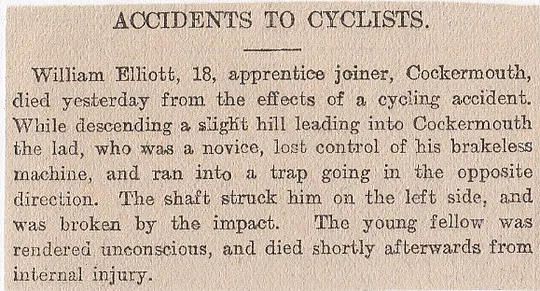
55/ Citadel Station Suicide, Carlisle July 1865
A woman named Eddy committed suicide at the Citadel Station, when she waited for a train to approach the station, then lay face down on the tracks. The guard irons caught her and flipped her over, then the three carriages passed over her body. A verdict was returned of “Temporary Insanity”.
56/ Laithes Hall Fatality, near Penrith, May 1850
Mr Orridge, Governor of Carlisle Gaol, went on a visit to Laithes Hall and stayed up till eleven p.m., then retired to bed. At around three a.m.he got up and wandering about in the dark, he fell over the bannister, onto the solid hall floor, sixteen feet below. Mr Parkin heard the commotion and groans of the victim and found him lying there. Orridge died four days later, but when asked about the incident he couldn’t remember anything between leaving his room and impact of the floor. (Sleepwalking seems likely?)
57/ Whitehaven Deaths, September 1885
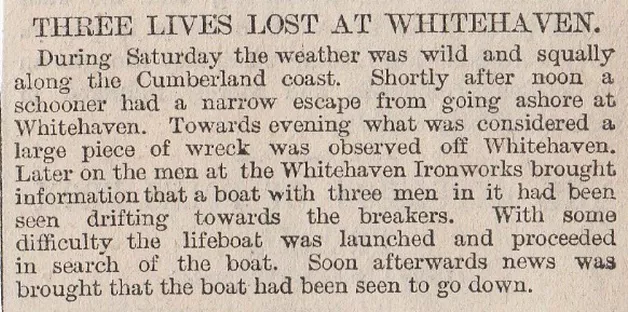
58/ Carlisle-River Eden, October 1871 ( Suicide Diary) WEIRD*
This one is really freaky-deaky. Samuel Howard jumped off a bridge at Carlisle into the Eden and he left a diary of his suicide.
“Sunday, September 24th. Life, as it is, is a word without meaning, and not worth experiencing in it’s best form. Why? It is only waiting to be dissolved, live as we like. I consider a man capable of being extinct when he is dissatisfied with everything- in fact, ending his own personality. A man of a strong and determined mind is capable of executing any deed, as far as regards nerve. So, all suicides are not cowards. A coward would rather kill another than himself. Cowardice always dies a natural death.”
This entry was written while looking at the river.
“19th. I am not adapted to all intellectually, and would like to live an honest life and have pretty well, so far; but I see everything looks not worth living for. Oh, how I should like to be a sociable thing, but I cannot be, properly speaking now. Looking down on these smooth waters, I fancy they are adapted for the easiest way to leave this world full of woe-a continual warfare to try to exist. But what Folly! We will have to go at last. Now, I can swim, and when I plunge I don’t want to get out alive again. Anybody is welcome to take me out if they please, but I hope not alive. Oh, what folly to become old and decrepit-useless, in everybody’s way. Oh, corrupt world it is a disease of the human family. I write rather bad but never mind, it will soon be all over. Now my end is approaching, it don’t seem hard to me. It will save me a deal of trouble in the next as far as regards future existing towards a dissolution, and it may as well be now as a hundred years hence.
Now some like a memorial after death, but such is the vanity of vainglorious beings. Well may Darwin-yes, Mr Darwin may call us naturalised monkeys. You will be monkeys when you cannot call yourselves to recollection. Is the last word spelled right? What do you think of it? I mean humanity at large. My watch will stop according to station time the moment I enter the water.
Oh Dear: but death has lost its fear to a certain extent, but it is harsh to cause one’s own dissolution. O, that I was never born! I must finish this, my thoughts ensign, and consign myself those dreadful waters. I would much rather die and sleep now. I came to Carlisle last Monday week. I live for nothing. I wish my gold watch to be given to my father, black suit, four gold studs, gold ring, and gold watch and chain on the watch. I have a pound on me, and that’s for the man who picks me up Goodbye.”
This had been added before his last hurrah…….! Six minutes to eleven. I called in here, at the Crown Inn, Sauwix. A little brandy to warm me before I get cold; and here I saw an old dame, lame; a cat with its tail cut off, lifting himself upon his hind legs, to open the door with his paws; a girl with clogs clatters all over; a hump-backed woman says the weather will be hot in a minute. Here she is. She looks as if she had been dragged through a sick hospital. This is the Crown Hotel.
The last entry made, must have been while on the bridge……..”This poor old man, Edward Allen, I met poverty struck. I gave him the last money I have, and this book to the authorities. He is the owner of the last pound I have. Don’t take it from him- Samuel Howard.”
59/ River Derwent Drowning near Keswick, June 1899
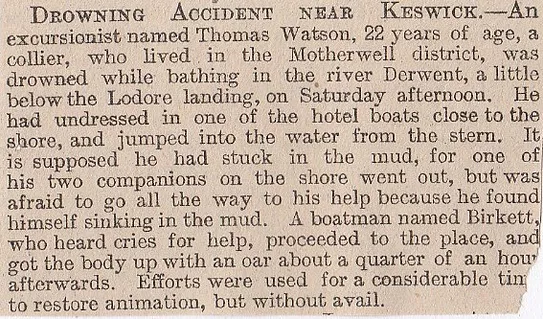
60/ The Solway Drowning, June 1899
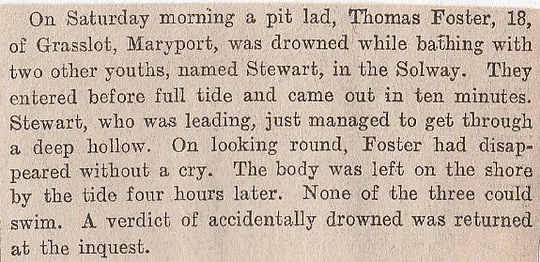
61/ Shap: Lovers Suicide, April 1873
A young lady from Kirkbride, Cumbria, killed herself by putting her head on the train tracks near the village of Shap, and let the engine run over her frail little body. The reason for this was that she became despondent because she hadn’t heard from her sweetheart. This would seem to be true, from the fact that the sweetheart himself committed suicide in exactly the same way. A train driver was coming into Brayton terminus and he saw the figure of a man put his head on the tracks. He tried to stop the engine but he cut his head clean off and the remains were taken to Brayton station. The man’s name was Colson.
62/ Hodbarrow Mining Co., Millom (Two Miners Killed) September 1870
63/ Barrow Docks Deaths, August 1870
64/ St Nicholas Junction Collision, Carlisle (Five Killed) July 1870
August 3rd, 1870 Inquest into Carlisle Railway Accident
65/ Millom Mining Accident October 1870 (Hodbarrow Mines- two killed)
66/ Armathwaite Fatal Riot, 18th October 1870 (See No 67 below also)
67/ Armathwaite Murder (see above, No 66) October 31st 1870
68/ Aldersceugh Poisoning, December 1866 (Aldersceugh Cottage north of Bothel is the only sign of the hamlet that used to be)
69/ Violent Deaths in Carlisle, January 1867.
70/ Rail Disaster near Penrith, February 1867 (Two Killed)
71/ Levens Skeletons, March 1867
72/ Fatal Accident on Scafell, December 1903. (See No.52 for another Scafell Death)
73/ Fatal Explosion at St Helen’s Colliery, Workington. January 8th, 1904
Saturday, January 9th, 1904.
Two miners were killed and seventeen others injured by an explosion at St Helen’s Colliery, Workington, on Thursday night. The body of one man, Hoodless, has not yet been recovered. The horses have been brought out of the pit and the fire has been bricked in, but some days will probably elapse before the fire is extinguished. Mr Scoular, Mr Martin, secretary of the Cumberland Coal Owners’ Association, Mr Morrison, the manager, and the rest of the injured are making satisfactory progress.
74/ Infanticide at Cavendish Dock, Barrow-in-Furness. January 1904.
75/ Man Killed on “The Haystacks”, Buttermere. July 1904
76/ Four killed in Warship Explosion, Barrow-in-Furness. September 1906 (The 15,000-ton cruiser “Rurik” was launched on November 1906, out of service in 1919, and then scrapped in 1930)
77/ Murder of an Aunt in Millom. April 13th,1907
A shocking murder was committed on Tuesday at Millom, Cumberland, by a miner named Allen Kennedy. Kennedy, who had only been married six weeks, lived with his aunt, a Mrs Hunter, of private means, in Albert Street, Millom. The aunt and Kennedy and his wife, who got on very amicably together, were sitting in the kitchen, when Kennedy suddenly rose and attacked Mrs Hunter with a razor, causing a terrible and fatal wound. Kennedy was formally charged at the local police-court on Wednesday with killing and murdering Hunter and was remanded until Saturday. Asked if he had any reason to show why he should not be remanded, the accused replied, “No, I suppose I have not. I’ll wait until Saturday.”

